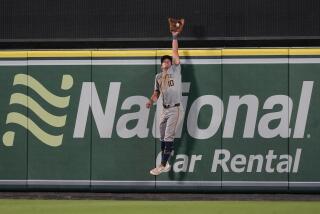Harvey’s Wallbangers Rise Again as Brewers Rout the Angels, 16-3
MILWAUKEE — Jim Slaton was a member of the Milwaukee Brewers in 1982, when the lineup of Robin Yount, Gorman Thomas & Co. was nicknamed Harvey’s Wallbangers and terrorized American League pitching all the way to the World Series.
Monday night, Slaton returned to County Stadium and, along with two other Angel pitchers, helped provide a brief flashback for a team that has resembled Bamberger’s Hamburgers this year.
The Brewers, whose lineup could be described as Punch and Judy except for the fact that it usually lacks punch, unloaded on Slaton and successors for a barrelful of season offensive firsts during a 16-3 rout of the Angels before a crowd of 13,389.
Among them:
--Most runs in a game since 1983.
--First back-to-back home runs since last September.
--First three-home run game since June 9.
--Second most productive inning of the year in the eighth. The Brewers scored eight times in an inning the Ringling Brothers would have loved, one run shy of Milwaukee’s season high.
This was achieved, remember, by a team that ranks next-to-last in the American League in home runs (50 before Monday), has been outhomered nearly 2-to-1 and has received 15 home runs from its outfield.
For the Angels, it was their second loss in a row, coming on the heels of Sunday’s fundamentally unsound 8-4 loss to Boston.
After opening 1985 with a 4-2 record, Slaton (4-9) has lost his last seven decisions. His last victory came more than two months ago, May 19 against New York.
He had hoped to get well against the bashful, bash-less Brewers. “I needed to get one (a victory) under my belt,” Slaton said. “Each time you go out, you think this will be the game.
“Then you got out there and nothing happens.”
Slaton surrendered three runs in the first inning and yielded back-to-back home runs to Cecil Cooper and Ted Simmons in the fifth before being mercifully removed from the game by Manager Gene Mauch.
He’s had some difficult setbacks during the streak--losses of 2-1 and 2-0 to Cleveland’s Bert Blyleven within a span of five days in June--but after allowing Milwaukee eight hits and six runs in 4 innings, Slaton termed this one “the toughest of them all.”
“This is definitely the most frustrating time of my career,” said Slaton, slumped in a chair in front of his locker. “There was a time in this bad streak when I pitched better than when I won. I just didn’t win those games. This makes it (the slump) look all the worse.
“I thought the first part of last season was a nightmare. This has been worse on me. I worked hard all winter and spring. Nobody was counting on me to be a starter. I earned the job in the spring.
“I just haven’t pitched well enough to keep it.”
Slaton’s drought, coupled with the imminent return of disabled left-handed starter Geoff Zahn, could soon signal Slaton’s demotion from the rotation.
“We’ll have to re-evaluate Slaton’s situation in the next two or three days,” Mauch said. “A pitcher can get in a slump, just like a hitter, and the mental part affects him the same way. Jimmy’s not pitching with an awful lot of confidence right now.”
And what, if anything, can a manager do to buoy a pitcher’s dashed confidence?
“The biggest thing a manager can do,” Mauch said, “is to keep giving him the ball--and we have done that. Whether we can continue is something we have to decide.”
Sympathy for Slaton spread throughout the Angel clubhouse. As Slaton spoke quietly with reporters, pitcher Ron Romanick wandered by and draped an arm around Slaton’s shoulder.
“You can’t believe how I feel for him,” Mauch said. “No nicer man ever played the game. There has been no tougher competitor.
“When he got off to that great start in April, the reaction was total elation by everyone on this team. When the season started, you don’t figure Jim Slaton is going to go 15-6. But when he got off to that start, you say, ‘Why the hell not?’ ”
Mauch stopped and pressed a hand to his forehead.
“I’ve got some kind of a headache all of a sudden.”
It was that kind of night for the Angels. The Brewers came close to equaling their all-time single game run output (19) against Slaton and his replacements, Pat Clements and Doug Corbett.
The outcome was already decided in the seventh inning, when Ben Oglivie hit a two-run home run off Clements to give Milwaukee an 8-3 advantage.
Then came the eighth. The Brewers, assisted by three Angel errors, sent 13 batters to the plate in the inning, scoring eight times.
Twice, Milwaukee scored runs by hitting the ball to first baseman Rod Carew, who fired home to catcher Bob Boone, who was cited for two errors. The first came when Boone dropped the ball while attempting to tag Paul Molitor. The second came when Boone apparently forgot there was no force play at home and failed to tag Oglivie.
There was also a throwing error by Bobby Grich and a dive by third baseman Doug DeCinces that left DeCinces in foul territory, Charlie Moore’s single down the line in left field and DeCinces’ glove resting on the infield dirt.
Afterward, Mauch was left to search for positives. He had to grope.
“I like the way we made the errors,” is what Mauch finally came up with. “I mean, nobody likes errors. But those came on attempts to turn tough plays into double plays. I like that.
“If we had been ahead, those plays would not even have been attempted. We would’ve gotten an out here, an out there. Tonight, it was just ‘Let’s shut them down and get it over with.’ ”
Finally, after more than three hours, the Angels succeeded. It was their only success of the evening.
Angel Notes
Hidden Ball Aftermath: The hidden-ball trick Boston second baseman Marty Barrett pulled on Doug DeCinces Sunday was still a topic of discussion around the batting cage Monday. With a day to think about it, DeCinces had to admit “it was a great play. The ball was away from the play, no one was thinking that he (Barrett) had it.” That was an illusion created partly by Red Sox pitcher Al Nipper, who was fidgeting on the mound just behind the pitching rubber. DeCinces thought Nipper had the ball, readying to make his next pitch, when in fact Barrett had it buried in his glove--ready to flip it to shortstop Glenn Hoffman, who slipped behind DeCinces at second to make the tag. “You ask 90% of the players in the league,” DeCinces said, “and they’d tell you it’s a balk if they see the pitcher walk (around) on the mound without the ball. He (Nipper) was on the top of the mound.” But--and this is the key phrase in the rule book--Nipper wasn’t straddling the rubber, which made the hidden-ball trick legal. “If that’s the rule,” DeCinces said, “I’m out. But, as an old Italian philosopher once said, ‘Payback is a bleep.’ ”
More to Read
Go beyond the scoreboard
Get the latest on L.A.'s teams in the daily Sports Report newsletter.
You may occasionally receive promotional content from the Los Angeles Times.






